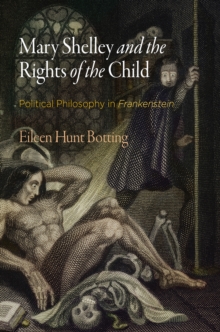Description
| Product ID: | 9780812249620 |
| Product Form: | Hardback |
| Country of Manufacture: | GB |
| Series: | Haney Foundation Series |
| Title: | Mary Shelley and the Rights of the Child |
| Subtitle: | Political Philosophy in "Frankenstein" |
| Authors: | Author: Eileen M. Hunt |
| Page Count: | 232 |
| Subjects: | Literary studies: c 1800 to c 1900, Literary studies: c 1800 to c 1900 , Literary studies: fiction, novelists and prose writers, Literary studies: fiction, novelists & prose writers, c 1800 to c 1900 |
| Description: | Select Guide Rating In Mary Shelley and the Rights of the Child, Eileen Hunt Botting contends that Frankenstein is a profound work of speculative fiction designed to engage a radical moral and political question: do children have rights? From her youth, Mary Shelley immersed herself in the social contract tradition, particularly the educational and political theories of John Locke and Jean-Jacques Rousseau, as well as the radical philosophies of her parents, the feminist Mary Wollstonecraft and the anarchist William Godwin. Against this background, Shelley wrote Frankenstein; or, the Modern Prometheus, first published in 1818. In the two centuries since, her masterpiece has been celebrated as a Gothic classic and its symbolic resonance has driven the global success of its publication, translation, and adaptation in theater, film, art, and literature. However, in Mary Shelley and the Rights of the Child, Eileen Hunt Botting argues that Frankenstein is more than an original and paradigmatic work of science fiction—it is a profound reflection on a radical moral and political question: do children have rights? |
| Imprint Name: | University of Pennsylvania Press |
| Publisher Name: | University of Pennsylvania Press |
| Country of Publication: | GB |
| Publishing Date: | 2017-11-21 |


